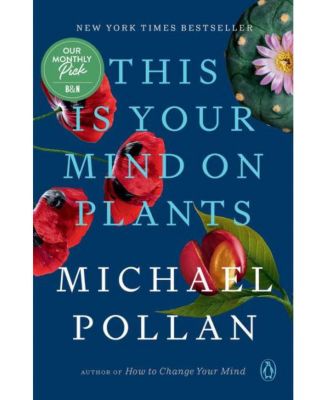This Is Your Mind on Plants by Michael Pollan
Product details
Web ID: 15419050What Makes Certain Plants Illicit?
In "This Is Your Mind on Plants," Journalist Michael Pollan limits himself to discussing three plants w/ psychoactive properties which have been used/misused by humans throughout history. I have so many book darts w/ interesting statistics or thoughts that I can't possibly share them all. The three plants are the opium poppy (opium and its derivatives); coffee bean tree/tea plant (caffeine); and peyote and relatives (mescaline). Caffeine is the most widely-used psychoactive chemical in the world -- and the industrialized world is dependent upon it to keep its workers on time and productive. Think about it: before an easy way to overcome our circadian rhythms being set by the sun, shift work couldn't have existed, and therefore, neither could 24-hour industrial production. I enjoyed the history of how both coffee and tea made it from the tropics to the "Western" world, and the contrasts between who drinks coffee versus tea. Mr. Pollan proves his point on caffeine's aid to productivity by giving up caffeine the entire time he was trying to write an article about it. Mr. Pollan is a gardening writer, and wanted to grow poppies in the interests of an article about it. Yet knowingly growing opium poppies can get one into huge legal trouble, as they are illegal to grow -- yet widely available in seed catalogues under different names. Making a hot drink from the sap is as easy as spitting open a seed pod! Pollan explores the irrationality of the "war on drugs;" his terror over legal trouble and civil forfeiture (losing physical assets when being arrested for a drug crime, such as one's house); and the irony of normal folks getting arrested over pretty flowers in their gardens, while the Sackler family (Purdue Pharma) has made billions of dollars and destroyed millions of lives w/ their pharmaceutical product made from the poppy: OxyContin. Mr. Pollan rather lost me in his over-long discussion of mescaline. He was very concerned about cultural appropriation in experiencing peyote, and in fact, he was not allowed to do so as he does not belong to the Native American Church. One has to be a certified member of a Native Tribe to belong and to thus use peyote, which is only legal when used as a rite in "church services" (eg sweat lodges). He therefore experimented w/ San Pedro, a peyote relative. There is a long description of his and his wife's experience during a night "high" on mescaline; the "high" lasted 14 hours! Apparently, the length of the high is why psilocybin (magic mushrooms) is getting studied officially instead of mescaline. As a pharmacist, the "Introduction" was my favorite part of the book, as it discusses what makes a plant "licit" or "illicit." According to Pollan, an "illicit" drug is "whatever the government decides it is." These plants almost always are ones that alter our consciousness, or "with the power to change consciousness in ways that run counter to the smooth operations of society and the interests of the powers that be." p. 2. This is why mind-altering hallucinogens are illegal; caffeine is not only legal but encouraged; and opium exists in-between: legal when produced by pharmaceutical companies yet illegal when grown at home and made into tea. I really enjoyed this one; the science is easily accessible to anyone w/ an interest in the medicinal use of plants.
Recommends this product

Customer review from barnesandnoble.com

